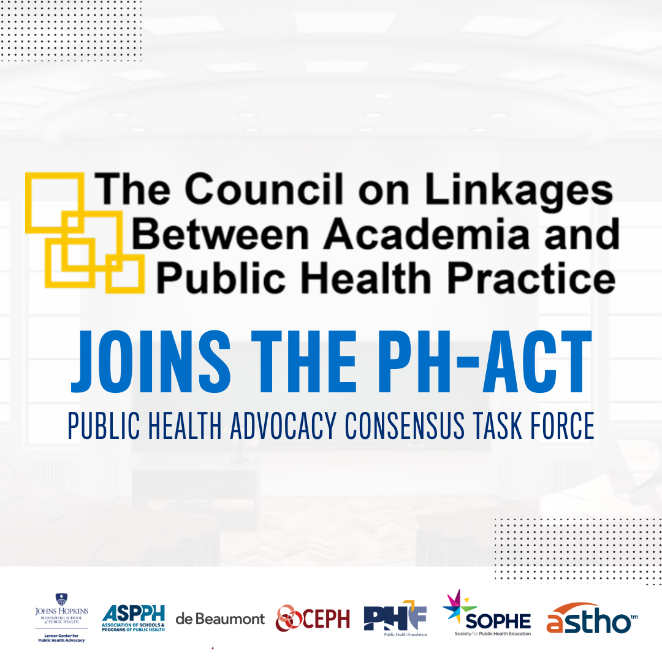
By Glenn E. Schneider, Director, Public Health Advocacy Consensus Task Force; Johns Hopkins Lerner Center for Public Health Advocacy; [email protected]; 443-812-6955 cell
In August 2024, the Council on Linkages Between Academia and Public Health Practice (Council on Linkages) voted to join other leading national organizations participating in the Public Health Advocacy Consensus Task Force (PH-ACT). Together, PH-ACT hopes to improve advocacy instruction in schools and programs of public health (SPPH) so that the students and workforce of tomorrow are better prepared to address the public health challenges we face.
 Knowing how to advocate is essential… We all agree that improving policies, systems, laws, and governmental budgets is an essential public health enterprise. So much so that the accrediting body for schools and programs of public health – Council on Education for Public Health (CEPH) – released its advocacy competency for students, and the Council on Linkages released the updated Core Competencies for Public Health Professionals that includes two advocacy competencies.
Knowing how to advocate is essential… We all agree that improving policies, systems, laws, and governmental budgets is an essential public health enterprise. So much so that the accrediting body for schools and programs of public health – Council on Education for Public Health (CEPH) – released its advocacy competency for students, and the Council on Linkages released the updated Core Competencies for Public Health Professionals that includes two advocacy competencies.
Yet, we are not “advocacy-ready”… There are signs that neither students nor the workforce can effectively engage in advocacy to improve public health outcomes, eliminate health inequities, and achieve social and environmental justice. Recent studies show that nearly half of public health department executives desire more training on how to prioritize and influence policies that affect the health of their communities. Fewer than a third of non-profits, many of which employ public health graduates, report conducting any advocacy activities (even non-lobbying ones) that could improve health policy. Organizations that do advocate emphasize the importance of having staff with advocacy knowledge and experience.
Our Advocacy 1.0 instructional model needs an upgrade… It’s been almost 10 years since CEPH issued its advocacy competency, and yet no public health school requires an advocacy class for graduation. Furthermore, an analysis of 98 SPPH advocacy-related syllabi showed that only 7% had advocacy-related content and skills as their main focus. Less than half taught advocacy skills most often used in policy change campaigns and courses varied widely on what advocacy skills were emphasized. Most advocacy content was delivered as part of a survey, health policy, or healthcare administration course which limits the comprehensiveness of the advocacy content covered. Only 10% included content that would help a student apply equitable principles to advocacy efforts.
Most urgently, it appears we need to find consensus as a field on the definition of public health advocacy and the essential skills that must be taught to and learned by all Master of Public Health (MPH) students at the very least. In a cursory scan of the literature, we found more than 70 distinct definitions of “public health advocacy.” Though we want people to know how to advocate, our lack of consensus on its meaning makes it hard to operationalize essential advocacy skills. This, by itself, limits our ability to become “advocacy-ready” as a field.
Let’s find a solution together… The
Johns Hopkins Lerner Center for Public Health Advocacy and the de Beaumont Foundation, in partnership with other leading national and state public health organizations launched the Public Health Advocacy Consensus Task Force (PH-ACT) in the spring of 2024, with three key objectives:
- Gain consensus on the definition of public health advocacy;
- Identify the essential advocacy skills needed to operationalize it; and
- Draft guidance that could help schools and programs.
Over the next year, we will build the PH-ACT Advisory Committee comprised of both field luminaries and representatives of leading organizations in both academia and practice. We will conduct an expert study to get us closer to consensus on the first two objectives above then take the findings and workshop them in focus groups to help draft sound guidance. And all along, we will hold town hall meetings to get input from faculty, practitioners, and students alike who want to be a part of this important change process.
We are so pleased to have the Council on Linkages and the Public Health Foundation join PH-ACT. For more than 30 years, the Council on Linkages has been a leader in the field, and has repeatedly provided a roadmap to a strong, vibrant, and competent workforce. Our partnership will hopefully lead us to a better Advocacy 2.0 instructional model for schools and programs of public health and better health outcomes for all.
Time to take PH-ACTion… If you are interested in endorsing this effort personally, visit our
website and fill out the form there. Come to one of our upcoming Town Hall meetings at
SOPHE’s Advocacy Summit or
APHA’s Annual Meeting. Volunteer to be in one of our focus groups. Or simply endorse the process.
If you are an organization wishing to be a partner in the effort, email me at [email protected].
PH-ACT Lead Partners: